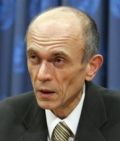Slovenia wants Darfur rebel JEM to sign peace deal
May 31, 2006 (LJUBLJANA) — A Darfur rebel leader who rejected an African-drafted accord to resolve the crisis in western Sudan arrived Wednesday in Slovenia – a European country whose leader has made a surprise mediation bid.
 Rebel leaders “will have to decide in Slovenia whether they will accept the peace accord — even with some complaints — or whether they will insist on rejecting it,” Slovene President Janez Drnovsek said.
Rebel leaders “will have to decide in Slovenia whether they will accept the peace accord — even with some complaints — or whether they will insist on rejecting it,” Slovene President Janez Drnovsek said.
Khalil Ibrahim arrived on the day a deadline set by the African Union expires for his Justice and Equality Movement and another holdout group to agree to a deal the Sudanese government and the largest rebel movement signed May 5 after protracted, AU-mediated talks in Nigeria.
Yesterday, Drnovsek held talks with the chief JEM negotiator, Ahmed Tugod Lissan, member of the JEM leadership Abdullahi Osman El-Tom, and Ahmed Diraige, the chairman of the Federal Democratic Alliance and former Darfurgovernor.
In Drnovsek’s view, the only way for the JEM to sign the peace deal is for the group to say what reservations they have about the agreement. “The JEM leadership will have to make a decision in Slovenia,” he stressed.
Diraige shared Drnovsek’s view, labeling JEM’s participation in the peace process as crucial. Although Diraige as a representative of an all-Sudanese party is not directly involved in the Darfur peace process, he was pleased to have had an opportunity to talk to the JEM.
Speaking at a joint press conference with Drnovsek, Diraige expressed hope that the African mediators will extend the deadline for the signing of the peace accord, and find an acceptable solution which will not lead to increased tensions.
Violence has only increased in Darfur since the signing of the peace treaty, drafted by the A.U. with last-minute amendments proposed by U.S., U.K. and other mediators to meet rebel demands. The peace pact was weakened because it wasn’t embraced by all the rebel movements, and Darfur’s numerous armed bands appear to be battling for strategic positions before the international community forces them to respect the cease-fire and disarmament called for under the accord.
Both the rebels and the Sudan government have repeatedly failed to live up to the agreements struck over two years of negotiations in Nigeria.
The holdouts to the May 5 pact expressed concerns it didn’t guarantee security and compensation for war victims. Drnovsek met two of Ibrahim’s top aides late Tuesday and later said they remained “firmly” against the accord.
Drnovsek said it was difficult to predict whether the rebels would accept the pact before the deadline expired, but said, “We’re now seeking a formula that would keep them in the game and make sure that the peace process is not suspended.”
The Justice and Equality Movement is the smallest of three main Darfur rebel groups. It’s linked to Sudan’s leading militant Islamic ideologue Hassan Turabi, while the other rebel groups in the predominantly Muslim region are seen as secular.
Drnovsek has no track record as an international mediator, and appears to have adopted the Darfur crisis out of personal interest. He traveled to U.N. in New York last year to present his plan for Darfur, but no one engaged him officially as a mediator.
Drnovsek had invited all Darfur rebel groups to Slovenia in February, but the meeting never occurred because the rebels were too divided and because of international concerns such a meeting would hamper the A.U.-led peace process.
Drnovsek’s recent interest in Darfur and efforts to present himself as an international champion of the weak and the poor have baffled some in Slovenia, once part of Yugoslavia. He left his party, the Liberal Democrats, and established his own Movement for Justice and Development.
His political shift over the last year coincided with other changes. He became a vegetarian, moved from the capital, Ljubljana, to a remote village where he follows a careful diet and bakes his own bread, and has traveled to India to study meditation.
(ST)
